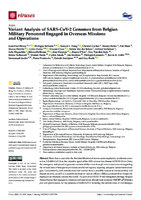| dc.description.abstract | The 2019 coronavirus disease (COVID-19) is an infectious disease caused by severe
acute respiratory syndrome coronavirus 2 (SARS-CoV-2), a single-stranded RNA beta-
coronavirus with a genome 29,903 nucleotides long [1]. First identified at the end of 2019
in Wuhan, China, it spread rapidly and caused the ongoing global pandemic. Even though
the disease predominantly causes lung damage, other organs such as the heart can also be
affected [2]. At the time of writing (17 April 2021), 175,987,176 confirmed COVID-19 cases,
including 3,811,561 deaths, had been reported to the World Health Organization (WHO)
worldwide [3]. Although coronaviruses have a genetic proofreading mechanism, viral
mutations occur and can spread and increase in frequency, mainly due to natural selection
of beneficial mutations. SARS-CoV-2 protein sequence diversity may be associated with
pathogenicity and/or transmission of the virus, and certain SARS-CoV-2 genotypes or
variants were found to be specific to geographical locations [4]. Therefore, it has been
suggested that genomic, epidemiological, and clinical data should be combined to better
understand the infectivity and pathogenicity of SARS-CoV-2 [5].
Today, the risk associated with the international spread of new SARS-CoV-2 variants
(via travel) is a matter of great concern. In November 2020, a new SARS-CoV-2 variant,
named B.1.1.7 or 20I/501Y.V1 (depending on the nomenclature used), was identified in the
United Kingdom (UK) [6,7]. In December 2020, it was reported that the transmission rate
of this variant could be up to 71% higher than for other variants [7]. This new variant was
subsequently identified in several other countries and has become globally dominant today.
It was recently suggested that the B.1.1.7 variant causes higher COVID-19 mortality [8], and
it was found to be associated with higher viral load and younger age of infected patients [9].
Another highly transmissible SARS-CoV-2 variant named B.1.351 (or 20H/501Y.V2) likely
emerged from the first wave of the South African COVID-19 epidemic and then spread
quickly to its neighboring country of Botswana in December 2020, as well as several
other countries across the world in January 2021 [10]. There are concerns that certain
mutations in the spike protein (e.g., K417N, E484K, N501Y) could decrease the effectiveness
of COVID-19 vaccines. An increased resistance of variant B.1.351, but also B.1.1.7, to
antibody neutralization has been reported [11]. More recently, Wang et al. reported that
an emergent variant from Brazil, named P.1 or 20J/501Y.V3, was also more resistant to
neutralization by convalescent plasma and vaccine sera [12]. Even though a small study
examining the impact of the N501Y mutation on the Pfizer-BioNTech vaccine did not show
any loss of antibody neutralization efficacy, further studies examining the impact of other
mutations (e.g., K417N, E484K, . . . ), and involving the other COVID-19 vaccines, are
required [13]. |

